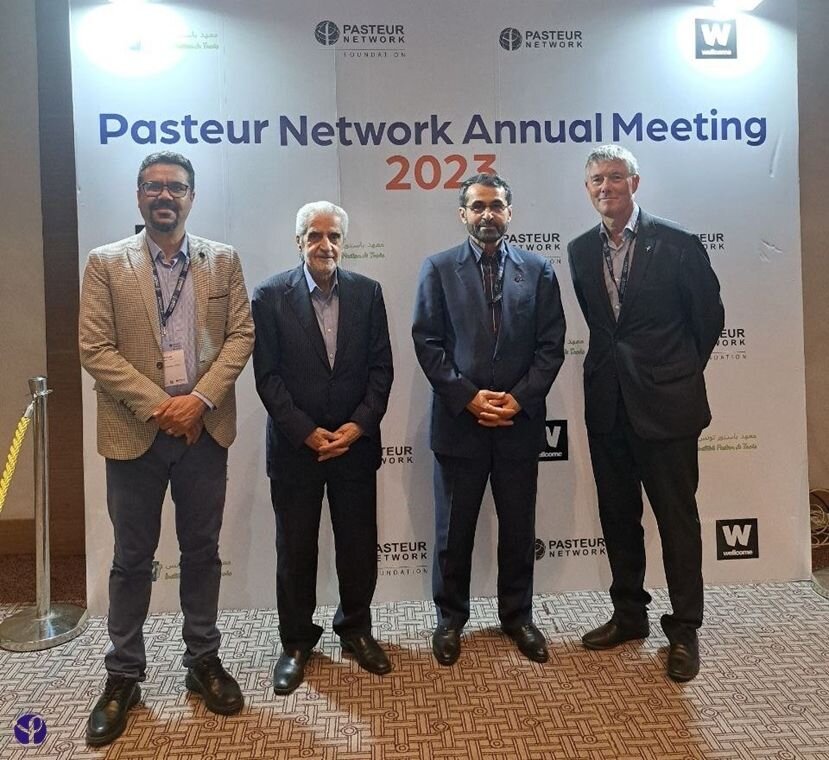Iran attends Pasteur Network Annual Meeting

TEHRAN – A delegation of health experts participated in the Pasteur Network Annual Meeting (PNAM), which was held from November 19 to 22 in Tunis.
Every year, the annual meeting gathers most of the members of the Institute Pasteur International Network and experts from scientific and public health institutions, multilateral organizations, NGOs, and charities and foundations dedicated to science and public health.
The annual meeting provides an excellent opportunity for the representatives of the university to simultaneously meet the leaders of all the units of the network, the representatives of the cooperative partners, and the senior management and administrative staff of the network and the foundation behind it.
On the sidelines of this meeting, the Iranian delegation headed by Rahim Sarvari, the president of the Pasteur Institute of Iran, held bilateral and multilateral negotiations with other members of the network, including the Pasteur Institute of Tunis, Dakar, Hong Kong, South Korea, and Paris to reinforce and expand cooperation.
A memorandum of understanding was signed between the heads of Pasteur institutes of Iran and Tunisia.
They also follow up on the needs of the Pasteur Institute of Iran through the Pasteur network.
This year, the main focus of the event was on global priorities, including contagious diseases that appeared recently –often as a result of or in connection with climate change and damaged biodiversity – Research, Development, and Innovation ecosystem, epidemic intelligence, antimicrobial resistance, and the general welfare of mothers and children.
After a series of roundtables and presentations, participants engaged in solution sessions on Pasteur Network strategic axes: reinforcing epidemic intelligence and preparedness with a specific focus on climate sensitivity; supporting the research, development, and innovation ecosystem in critical diagnostics, vaccines, and therapeutics; creating multi-disciplinary knowledge communities (such as training and education programs, career paths) that enhance learning and cooperation; and equitable collaboration, and sustainability.
Young researchers from the four regions of the network also had the opportunity to introduce themselves and to present their research respectively.
Pasteur Network
The Pasteur Network is a vast human and scientific community with more than 30 members in over 20 countries contributing together to global health.
Located in the heart of endemic areas, the Network has privileged access to a large number of pathogens that it monitors and studies on all five continents.
This exceptional diversity makes the Pasteur Network a unique global actor in public health, science, innovation, and education, especially in the fight against infectious diseases.
Pasteur Institute of Iran
In 2019, the Pasteur Institute of Iran joined the Asia-Pacific regional network, Alireza Biglari, former head of the IPI said.
The Institute Pasteur International Network was categorized into five regions namely Africa-Indian Ocean, the Americas, Asia-Pacific, Europe, and North Africa-Iran.
At a meeting of the Pasteur Institute's international network of presidents held in Yaounde, Cameroon, in November last year, the network's general assembly voted for Iran to be excluded from the North Africa-Iran regional network and join the Asia-Pacific regional network, Biglari explained.
The North Africa-Iran regional network included Iran, Morocco, Algeria, and Tunisia, and the Asia-Pacific network consists of China, South Korea, Hong Kong, Vietnam, Cambodia, Caledonia and Laos, he said.
He went on to highlight that from now on, the Pasteur Institute of Iran will have the opportunity to conduct joint research and educational activities with a stronger and more coherent network.
The two priorities of the Asia-Pacific regional network adopted at the meeting include microbial resistance, computational medicine, and bioinformatics, and the IPI will pursue joint programs in these two areas, he concluded.
Iran, a leading country in health
On April 15, Health Minister Bahram Einollahi said many countries in the region are asking Iran for help with issues related to health.
Emphasizing that all diseases are currently treated in the country, the minister added: “With the help of scientists, we were able to educate efficient human resources,” ISNA reported.
“With the efforts that have been made during the 44 years after the victory of the Islamic Revolution, today we have the strongest health system in the region in such a way that the health indicators in the Islamic Republic are far ahead of other countries in the region.”
All the indicators of health and treatment have made significant progress after the Islamic Revolution, and now Iran is one of the leading countries in this field, Saeed Karimi, the deputy health minister said.
MT/MG
